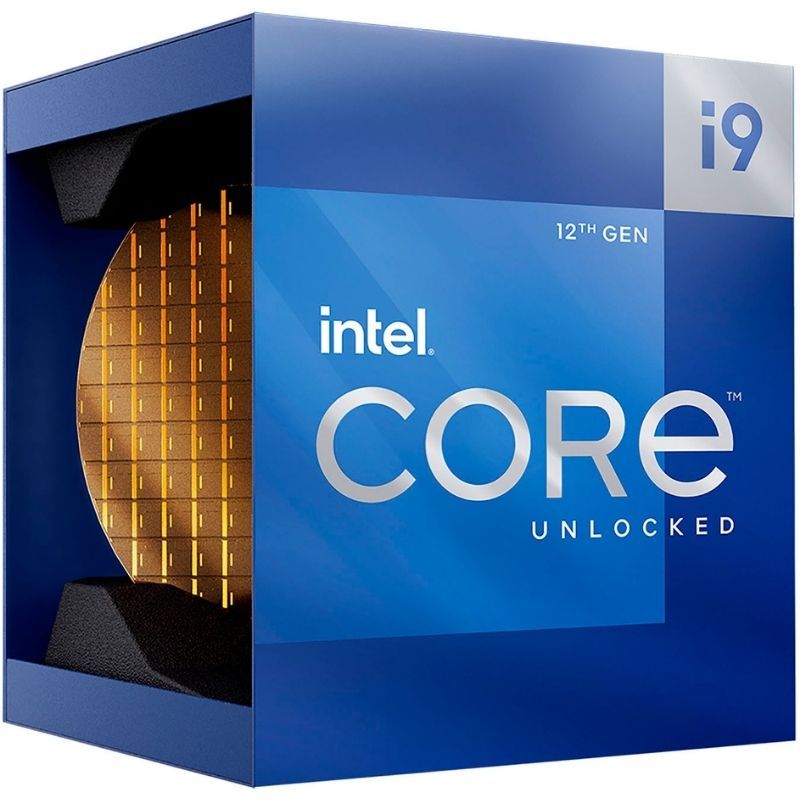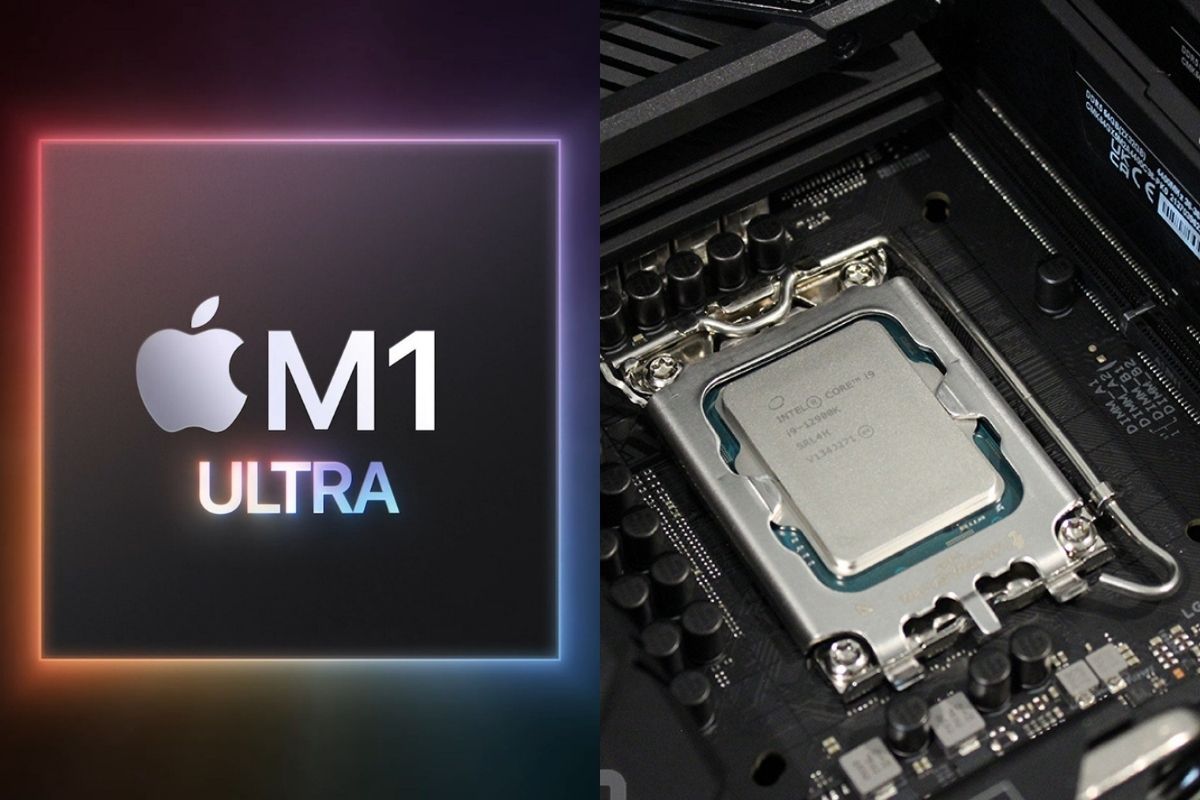Apple made a huge splash at its Sping "Peek Performance" event and surprised all of us by announcing the new M1 Ultra SoC. The new is essentially the fourth and the final member in the M1 family and it's Apple's most powerful chip to date. But ever since the M1 Ultra was announced, a lot of you are wondering exactly how it compares to Intel's new 12th-gen processors. After all, Intel has also made some significant improvements to its 12th gen processor this year. So in this article, we're going to take a look at the Apple M1 Ultra vs Intel 12th-gen processor comparison to see which one's better.
While Intel's new Alder Lake family has a lot of CPUs under both its desktop as well as the notebook lineup, we'll only be comprising the M1 Ultra with Intel's 12th-gen desktop chips. That's because the M1 Ultra is a workstation chip that's going to take charge of powering the next generation of powerful Mac desktops. While the M1 Ultra is making its debut with the new Mac Studio, we're expecting Apple to use the same chip to power future Mac desktops like the Mac Pro too.
Navigate this article:
Apple M1 Ultra vs Intel 12th gen Alder Lake: Specifications
Before we begin the comparison, here's a quick look at the specifications of both the Apple M1 Ultra chip and Intel's Alder Lake desktop CPU lineup. While we think only the unlocked desktop CPUs from the Alder Lake lineup can compete with Apple's new M1 Ultra chip, we've added specifications of all the Alder Lake desktop parts to this comparison. This should give you an idea of the kind of specifications you get with each Intel 12th-gen desktop chip and how they stack up against the new M1 Ultra SoC:
Apple M1 Ultra
|
Specification |
Apple M1 Ultra |
|---|---|
|
CPU Cores |
20 (16 Performance 'Firestorm' cores + 4 Efficiency 'Icestorm' cores) |
|
GPU Cores |
64-cores |
|
Neural Engine |
32-cores |
|
Memory channels |
32 LPDDR5 |
|
Unified Memory |
Up to 128GB |
|
Memory Bandwidth |
800Gbps |
|
Process |
5nm |
|
Transistors |
114Bn |
Intel 12th Gen Alder Lake-S mainstream unlocked SKUs
|
Specification |
Intel Core i5-12600K |
Intel Core i7-12700K |
Intel Core i9-12900K |
|---|---|---|---|
|
Cores |
10 (6P + 4E) |
12 (8P + 4E) |
16 (8P + 8E) |
|
Threads |
16 |
20 |
24 |
|
Base Frequency |
3.7GHz (P-core) | 2.8GHz (E-core) |
3.60GHz (P-core) | 2.70GHz (E-core) |
3.2GHz (P-core) | 2.4GHz (E-core) |
|
Boost Frequency |
4.9GHz (P-core) | 3.6GHz (E-core) |
4.90GHz (P-core) | 3.80GHz (E-core) |
5.1GHz (P-core) | 3.9GHz (E-core) |
|
L3 Cache |
20MB |
25MB |
30MB |
|
Default TDP |
125W |
125W |
125W |
|
Max. Operating Temperature (Tjmax) |
100°C |
100°C |
100°C |
|
Unlocked for overclocking? |
Yes |
Yes |
Yes |
|
Memory Support |
DDR4 3200MT/s | DDR5-4800MT/s Up to 128GB |
DDR4 3200MT/s | DDR5-4800MT/s Up to 128GB |
DDR4-3200 | DDR5-4800 Up to 128GB |
|
Integrated Graphics |
UHD Graphics 770 |
Intel Graphics UHD 770 |
Intel UHD 770 |
Intel 12th Gen Alder Lake-S mainstream (non-K) SKUs
|
Specification |
Intel Core i9-12900 |
Intel Core i7-12700 |
Intel Core i5-12600 |
Intel Core i5-12500 |
Intel Core i5-12400 |
Intel Core i3-12300 |
Intel Core i3-12100 |
Pentium Gold G7400 |
Celeron G6900 |
|---|---|---|---|---|---|---|---|---|---|
|
Cores |
16 (8P + 8E) |
12 (8P + 4E) |
6 (6P + 0E) |
6 (6P + 0E) |
6 (6P + 0E) |
4 (4P + 0E) |
4 (6P + 0E) |
2 (2P + 0E) |
2 (2P + 0E) |
|
Threads |
24 |
20 |
12 |
12 |
12 |
8 |
8 |
4 |
2 |
|
Base Frequency |
2.4GHz (P-core) | 1.8GHz (E-core) |
2.1GHz (P-core) | 1.6GHz (E-core) |
3.3GHz |
3.0GHz |
2.5GHz |
3.5GHz |
3.3GHz |
3.7GHz |
3.4GHz |
|
Boost Frequency |
5.0GHz (P-core) | 3.8GHz (E-core) |
4.8GHz (P-core) | 3.6GHz (E-core) |
4.8GHz |
4.6GHz |
4.4GHz |
4.4GHz |
4.3GHz |
N/A |
N/A |
|
L3 Cache |
30MB |
25MB |
18MB |
18MB |
18MB |
12MB |
12MB |
6MB |
4MB |
|
Default TDP |
65W |
65W |
65W |
65W |
65W |
60W |
60W |
46W |
46W |
|
Memory Support |
DDR4 3200MT/s | DDR5-4800MT/s Up to 128GB |
DDR4 3200MT/s | DDR5-4800MT/s Up to 128GB |
DDR4-3200 | DDR5-4800 Up to 128GB |
DDR4-3200 | DDR5-4800 Up to 128GB |
DDR4-3200 | DDR5-4800 Up to 128GB |
DDR4-3200 | DDR5-4800 Up to 128GB |
DDR4-3200 | DDR5-4800 Up to 128GB |
DDR4-3200 | DDR5-4800 Up to 128GB |
DDR4-3200 | DDR5-4800 Up to 128GB |
|
Integrated Graphics |
UHD Graphics 770 |
Intel UHD Graphics 770 |
Intel UHD Graphics 770 |
Intel UHD Graphics 770 |
Intel UHD Graphics 730 |
Intel UHD Graphics 730 |
Intel UHD Graphics 730 |
Intel UHD Graphics 710 |
Intel UHD Graphics 710 |
|
RCP Pricing |
$489 |
$339 |
$223 |
$202 |
$192 |
$143 |
$122 |
$64 |
$42 |
Apple M1 Ultra vs Intel 12th gen Alder Lake: Pricing & Availability
Apple's M1 Ultra is exclusive to the company's Mac Studio desktop computer, which means you'll have to shell out at least $3,999 to get your hands on an M1 Ultra-powered machine. It's worth pointing out that $3,999 is just the starting price for the base variant of the Mac Studio. A fully decked-out Mac Studio with all the bells and whistles will set you back as much as $8,000. Apple computers tend to be expensive, so we're not entirely surprised to see such a high price tag for an M1 Ultra-powered computer.

Apple Mac Studio
Apple's Mac Studio desktop with the new M1 Ultra chip starts as $3,999.

12th Gen Intel Core i9-12900K
The Intel Core i9-12900K is one of the most powerful mainstream chips on the market right now.
The competing Intel 12th-gen Alder Lake CPU like the Core i9-12900K, on the other hand, costs around $620 at the time of writing this article. Sure, you'll have to spend more on other compatible components to build a complete PC, but it's still not going to be as expensive as $3,999, let alone $8,000. Also, there are a lot of other options besides the 12900K in the Alder Lake lineup. You can also pick up something like the Core i7-12700 and still get really good performance out of it for the price. So in terms of the pricing, it's safe to say that getting your hands on an Apple M1 Ultra-powered desktop computer is relatively more expensive.
Apple M1 Ultra vs Intel 12th gen Alder Lake: Performance
While we're yet to get our hands on the new M1 Ultra-powered Mac Studio machine, we do have some insights from Apple's keynote and a couple of benchmarks scores from sources like Geekbench to give you an idea of what to expect. Even though Apple is using two M1 Max chip dies to create the M1 Ultra die with double the components, it's safe to say that the M1 Ultra is very much a desktop chip that's designed to go against the mainstream and even some workstation-grade CPU from Intel and AMD.
Apple compared the M1 Ultra's performance to Intel's new 12th-gen Core i9-12900K CPU and said its new chip performs slightly better while consuming less power. The Core i9-12900K, mind you, is the top-of-the-line CPU in Intel 12th-gen stack, so it's safe to say the M1 Ultra is practically going to beat every other Intel chip mentioned in the specs table above. We were also able to find some Geekbench scores of early M1 Ultra samples on the official Geekbench website. Here's a quick look at that:
While we'll perform our own tests once we get our hands on the new Mac Studio powered by the M1 Ultra processor, it's safe to say that we're looking at a significant performance improvement over the M1 Max chip as well as the Intel Core i9-12900K, especially in the multi-core score. As we mentioned in our Intel Alder Lake review, the Core i9-12900K scores around 17,500 in the multi-core test. The screenshots attached above show the Geekbench 5 score of M1 Ultra and the Core i9-12900K. That's a lot less than what we've been seeing in some of the preliminary Geekbench 5 tests for M1 Ultra. And just to put things into perspective, the AMD Threadripper 3990X CPU with 64 Zen 2 cores is just about 4.5% faster with 25,133 points.
The best thing about Apple's M1 Ultra chip is that it consumes far less power in comparison to some of these powerful chips. These numbers are indeed quite impressive, but it remains to be seen how the M1 Ultra chip performs in other benchmark applications as well as in tests outside of benchmarks.
Which one should you buy?
As powerful as the M1 Ultra is, both on paper as well as the leaked benchmark scores, we can't present our verdict on Apple's new chip just yet. It definitely looks very promising but there's no denying that it's very expensive. Notably, its availability is limited to just the Mac Studio computer, which means you'll have to spend at least $3,999 to get your hands on the base model of the Mac Studio. in comparison, we were able to put together an enthusiast-grade PC with an Intel Core i9-12900K and an RTX 3080 graphics card for just a hair over $2,800.
Unless you are hellbent on using the absolute best computing machine from Apple for a no-compromise experience, we think you'd be better off buying either an M1 Max-powered MacBook Pro notebook or build an Alder Lake-based PC. In case you are interested, you can check out Apple M1 Ultra vs M1 Max chip comparison. AMD will announce its new Ryzen 7000 series desktop chips later this year, and it'll be interesting to see how the new Apple M1 Ultra chip compares to some of the high-end AMD units.
If you are looking to buy the new Mac Studio desktop computer from Apple, then be sure to check out best Mac Studio deals page to see if you can save some money. Alternatively, you can also check our collection of the best Macs out there to see if you can find some other Mac that suits your needs and budget better than the Mac Studio.

